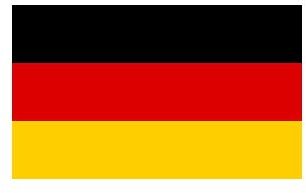Learn Some Basic German Phrases and Greeting Formalities
Origin of German Language
German belongs to the Indo European language family and, within this group, to the Germanic languages. As such, German is closely
related to Danish, Swedish, Norwegian, Dutch and English. The German language is divided into Hochdeutsch, or High German, which is the official written and spoken language, and Plattdeutsch, or Low German, which comprises a huge variety of dialects. The dialects vary considerably from North to South, often to the extent that a person from Hamburg who speaks real Plattdeutsch might not be understood in Munich, and vice versa. Another variety is Schwyzerdutsch, which is spoken in the German language part of Switzerland, and considered a language of its own and not a dialect.
Formalities
The English language only knows the word “you” as formal as well as informal address. German distinguishes between the informal Du, always spelt with a capital D, and the formal Sie, also always with a capital S. Although young people tend to be rather informal and use Du often on first meeting someone of their own age, the official address of an adult person is always Sie. Due to the influence of American and British habits to be quickly on first name terms, Germans have adapted a modified version by using the first name but continue to use Sie.
There is actually a ritual in Germany, called Bruederschaft trinken, which celebrates the transition form Sie to Du by toasting each other. The offer to duzen, which means: you may say Du, is instigated from female to male and from older person to younger person. Everything else may be considered rude, offensive or as a lack of respect.
Another formality is the use of Mr. = Herr and Mrs. = Frau. The equivalent of Miss = Fraeulein is no longer considered politically correct and has disappeared from the German language. Any female, regardless to age and marital status is now addressed as Frau, which can lead to somewhat ridiculous situations when a 15-year-old girl is afforded the title of a married woman.
Greetings
Hi!
That informal salute is also used in Germany, but only by young people.
Guten Morgen
Guten Tag
Guten Abend
Gute Nacht
These four greetings equal: Good morning, Good afternoon (after 12 am), Good Evening and Good Night. The literal translation of Guten Tag would be Good Day, but that form is not generally used in English (but is, for instance, typical for South Africa).
Auf Wiedersehen = Good bye
The pronunciation of all the above forms of greeting is as spelt. As far as Auf Wiedersehen is concerned, younger people tend to use the more informal Italian word ciao. It is in fact quite chic to do so.
Pronunciation
For online help pronouncing German words, try LEO, a German translator with pronunciation. Just type in the word you want to hear, and click on the speaker.
References
This post is part of the series: 30 most important German phrases
Learn about when to say Du and Sie, why the word Fraeulein has disappeared and the 30 most important phrases in German, starting with greetings and good bye.
